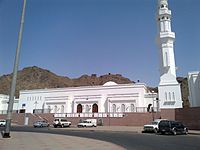Sahwa movement
| Part of a series on Islamism |
|---|
|
|
| Part of a series on:
Salafi movement |
|---|
 |
|
|
Sahwa movement (Awakening movement) or Al-Sahwa Al-Islamiyya (Islamic awakening) is a politically active faction of Saudi Salafism. In Saudi Arabia, the Sahwa movement has been involved in peaceful political reform. Safar al-Hawali and Salman al-Ouda are representatives of this trend.[1] Because of being active on social media they have earned some support amongst the more educated youth.[2][3]
This group opposed the presence of US troops on the Arabian Peninsula.
Origin[]
Muslim Brotherhood members arrived in Saudi Arabia in the 1950s and 1960s seeking refuge from persecution by the Egyptian socialist regime. They always had disputes with Wahhabism. Wahhabism and the Brotherhood influenced each other and this cross-pollination resulted in the birth of a hybrid movement of religious-political dissent known as the Sahwa movement. It reached a peak in the 1990s before being repressed by the Saudi establishment.[4]
Activities[]
Sahwa members write public petitions and circulate sermons on audio cassettes. Sahwa leaders demand a bigger role for clergy in governing, curbs on the royal family's privileges, greater transparency for public funds, and a more Islamically conservative society as a defense against Western cultural influences.[4]
Views[]
They oppose the presence of US troops on the Muslim land. In 1991, al-Hawali delivered a sermon stating: "What is happening in the Gulf is part of a larger Western design to dominate the whole Arab and Muslim world."[5]
See also[]
References[]
- ^ Heurman, Rinse (2020). Salafism and the Political: A Case Study of the Egyptian Hizb al-Nour (PDF) (Thesis). Radboud University Nijmegen. Retrieved 20 September 2021.
- ^ Qadhi, Yasir (22 April 2014). "On Salafī Islam" (PDF). MuslimMatters. p. 7. Archived from the original (PDF) on 14 February 2015. Retrieved 6 July 2020.
- ^ Lacroix, Stéphane (20 March 2014). "Saudi Arabia's Muslim Brotherhood predicament". The Washington Post. Retrieved 6 July 2020.
- ^ a b Murphy, Caryle (6 September 2011). "Saudi Islamists consider democracy, confront royal dogma". GlobalPost. Archived from the original on 18 September 2011. Retrieved 6 July 2020.
- ^ Bergen, Peter L. (2001). Holy War, Inc.: Inside the Secret World of Osama bin Laden. New York: Free Press. p. 78. ISBN 978-0-7432-3467-2.
- Islam in Saudi Arabia
- Salafi movement